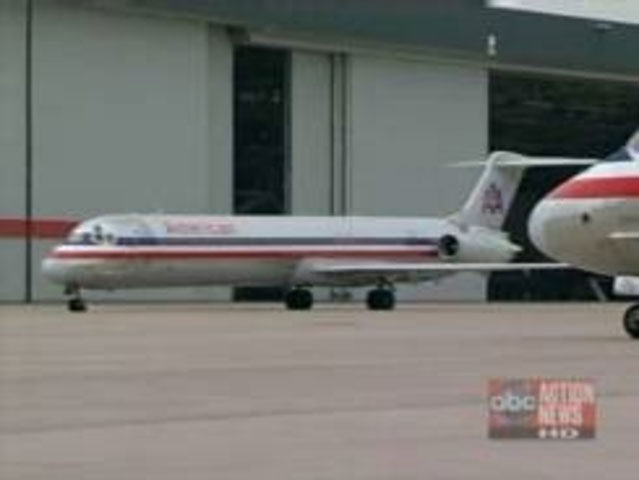'Deferred Maintenance' causing concern in the airline industry
"American has been cited and fined millions of dollars over the last 3-years, more than any other airline"
INVESTIGATION: 'Deferred Maintenance' causing concern in the airline industry
Pilots, Mechanics concerned about delayed repairs
05/20/2010
By: Alan Cohn
View Original

Photo from ABC News
TAMPA - An ABC Action News investigation is raising questions about the practice used by many airlines to defer or delay maintenance on airliners.
In exclusive interviews, a pilot and mechanic for one of the nation's largest airlines say the public should be concerned about a practice they believe "lowers the margin of safety."
"Could this cause a catastrophic problem?" We asked an aircraft maintenance technician working for a major airline. "Of course," he replied.
What we're talking about is called deferred maintenance, the practice that many airlines use to delay or put off repairs on aircraft until there's convenient time to fix them.
While it's legal under strict guidelines, an ABC Action News investigation has discovered some airline pilots, mechanics and even the US Department of Transportation are increasingly concerned about safety because of the frequency and reasons some airlines are delaying needed repairs to aircraft.
But one American Airlines pilot tells us, "They reduce the margin of safety."
Deferred maintenance has been cited as a contributing cause in a number of accidents, including the crash of an Alaskan Airlines MD-83 in 2000 off California which killed 83. Investigators cited delayed maintenance on its stabilizer system.
The government's concerns are contained in a newly released report blasting the FAA for a lack of rigorous oversight of maintenance at American Airlines.
American has been cited and fined millions of dollars over the last 3-years, more than any other airline, for repeatedly and sometimes inappropriately deferring repairs to its aircraft.
While a spokesman at American tells us the report deals with issues which have been long since resolved, at center stage is a 2007 incident that began in Tampa and ended in a near disaster two weeks later.
According to maintenance logs obtained by ABC Action News, when the MD-83 aircraft was in Tampa mechanics discovered a broken engine start valve.
For the next thirteen days parts of the start valve unit were replaced but the aircraft was not taken out of service despite reoccurring problems.
Eventually the aircraft with 138-passengers on board was forced to make an emergency landing in St. Louis after the flight crew first began getting engine start valve "warnings" moments before the engine burst into flames.
American Airlines tells us it has since addressed issues raised by investigators in training.
An American Airlines Aircraft Maintenance Technician in Tampa, who we're not identifying over concerns of retaliation, claims many times maintenance is deferred because of work load, lack of spare parts and pressure to get aircraft in the air.
"What should have happened?" We asked. "Maybe the aircraft should have been grounded for more checks," the technician told us.
"Airplanes don't make money on the ground. They've got to be flying," the aircraft maintenance technician told us.
"I've been approached more than once to sign this off we've got to get this out of here. Take care of it," he said.
American's pilots are concerned too. Mike Michaelis is head of safety for the airline's pilot's union and says over the last seven years there have been an increasing number of deferred maintenance items pilots have to deal with.
"Have there been times when you've boarded an aircraft where you've been concerned about something that's been written up? We asked. "Yes, there have been times we've denied or refused the aircraft," Michaelis told us.
"Are there consequences to the flight crew if they try to make too much of this to the company?" we asked. "There can be depending how they do it. Some would say I'm taking a risk here and can be disciplined by the company for even speaking about these things," Michaelis said.
"I have seen people not voice their concern because they are fearful of their job position," Michaelis added.
Michaelis says the union doesn't track how many times pilots have refused to fly but it does monitor how often crews fly aircraft with broken equipment.
According to the Department of Transportation, from 2004 to 2007 the number of deferred maintenance items at American increased 32-percent.
But Chuck Horning, head of Aviation Maintenance at Embry Riddle Aeronautical University in Daytona Beach says, just because repairs are sometimes delayed, it doesn't mean the aircraft is unsafe.
"Flying aircraft today is very safe. It's actually more safe now than it ever has been. It's not deferred for an indefinite period of time until maybe maintenance can be done there is a set period of time defending how critical that system is," said Horning.
While American says it's number of deferred repairs is down, this past March the airline was fined again for incorrectly deferring repairs on aircraft, including one case where a plane flew ten flights with an inoperative air data computer.
Other airlines have been cited and fined over maintenance issues too. Northwest, which is now merged with Delta, comes in second, followed by Alaska Airlines, and Southwest. American has been cited the most, according to USA Today.
An American Airlines spokesman calls the mechanic and pilot who talked to us "disgruntled," and their claims "baseless." As for the latest round of maintenance related fines, the company tells us it's "reviewing the information" and will "meet with the FAA "to discuss it."











